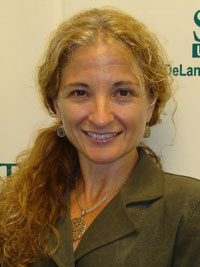Camille Tessitore King
Professor and Chair of Psychology
King, PhD was a 2004 recipient of the Hand Award for Excellence in Research; was honored for her outstanding work with undergraduates with a Faculty Advisor Research Grant from Psi Chi: The International Honor Society in Psychology; and, in 2011, she received the McEniry Award for Excellence in Teaching at Stetson.
- PhD, psychology, University of Virginia
- MA, psychology, University of Virginia
- BA, psychology, University of Virginia

Biography
After completing her undergraduate and graduate degrees in psychology at the University of Virginia, Camille Tessitore King did post-doctoral research at the University of Michigan. She was fortunate to be a stay-at-home mom for a while before returning in 1996 to teaching and research, working with Dr. Alan Spector at the University of Florida. Her collaboration with Spector (now at FSU) has been productive; they have received several National Institutes of Health research grants and published numerous articles on the functional consequences of taste nerve transection and regeneration and are now studying the functional organization of the gustatory cortex. In 2001, King was appointed assistant professor and was tenured and promoted to associate in 2007. She was a 2004 recipient of the Hand Award for Excellence in Research; was honored for her outstanding work with undergraduates with a Faculty Advisor Research Grant from Psi Chi: The International Honor Society in Psychology; and, in 2011, she received the McEniry Award for Excellence in Teaching at Stetson.
More About Camille King
Areas of Expertise
- Psychology
Course Sampling
- Drugs, Mind and Behavior
- Biological Psychology
- Great Experiments in Psychology
- Introduction to Psychology
- Consciousness: The Final Frontier
- The functional neuroanatomy of the gustatory system in rodents
- King, CT, Garcia M, Spector AC (2014) "Restoration of quinine-stimulated Fos-immunoreactive neurons in the central nucleus of the amygdala and gustatory cortex following reinnervation or cross-reinnervation of the lingual taste nerves in rats." J Comp Neurol. 522(11):2498-517. doi: 10.1002/cne.23546
- King CT, Garcea M, *Stolzenberg DS, and Spector AC. (2008). "Experimentally cross-wired lingual taste nerves can restore normal unconditioned gaping behavior in response to quinine stimulation," American Journal of Physiology, 294(3):R738-747.
- King CT (2004) "On blue tongues, undergraduates, and science: An Interview with Linda M. Bartoshuk," Teaching of Psychology, 31(3):212-217
- Galvin KE, King CT, and King MS (2004).Stimulation of specific regions of the parabrachial nucleus elicits ingestive oromotor behaviors in conscious rats," Behavioral Neuroscience, 118:163-172.
- King CT, *Deyrup LD, *Dodson SE, *Galvin KE, Garcea M, and Spector AC (2003). "Effects of gustatory nerve transection on quinine-stimulated Fos-like immunoreactivity in the parabrachial nucleus of the rat," Journal of Comparative Neurology, 465:296-308.
- King CT, Garcea M and Spector AC (2000). "Glossopharyngeal nerve regeneration is essential for the complete recovery of quinine-stimulated oromotor rejection behaviors and central patterns of neuronal activity in the nucleus of the solitary tract in the rat," Journal of Neuroscience, 20:8426-8434